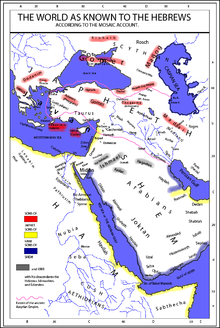Javan
This article needs additional citations for verification. (July 2022) |

Javan (Hebrew: יָוָן, Modern: Yavan, Tiberian: Yāwān) was the fourth son of Noah's son Japheth according to the "Generations of Noah" (Book of Genesis, chapter 10) in the Hebrew Bible. Josephus states the traditional belief that this individual was the ancestor of the Greeks.
Also serving as the
Javan is also found in apocalyptic literature in the Book of Daniel, 8:21-22 and 11:2, in reference to the King of Greece (יון)—most commonly interpreted as a reference to Alexander the Great.[2]
While Javan is generally associated with the ancient Greeks and Greece (cf. Gen. 10:2, Dan. 8:21, Zech. 9:13, etc.), his sons (as listed in Genesis 10) have usually been associated with locations in the Northeastern Mediterranean Sea and Anatolia: Elishah Magna Graecia, Tarshish (Tarsus in Cilicia, but after 1646 often identified with Tartessus in Spain), Kittim (modern Cyprus), and Dodanim (alt. 1 Chron. 1:7 'Rodanim,' the island of Rhodes, west of modern Turkey between Cyprus and the mainland of Greece).[3]
References
- ^ The /v/ of Hebrew yavan supports the generally accepted reconstruction of the early form of the name of the Ionians. See: Jewish Language Review, Volume 3, Association for the Study of Jewish Languages, 1983, p. 89.
- ^ See the classic reference commentary of Matthew Henry: http://www.ccel.org/ccel/henry/mhc4.Dan.ix.html
- ^ Anson F. Rainey, The Sacred Bridge: Carta’s Atlas of the Biblical Word, Carta: Jerusalem, 2006, 27; and Yohanan Aharoni, Michael Avi-Yonah, Anson F. Rainey, Ze’ev Safrai, The Macmillan Bible Atlas, Macmillan Publishing: New York, 1993, p. 21.
